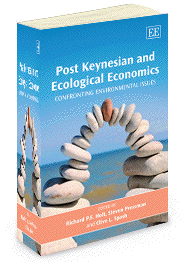My writing is mainly academic, appearing in peer reviewed journals and edited books. This site includes a fairly complete listing of as articles and chapters. Typically a manuscript will first appear as a working paper for discussion and publication occurs later. I have also edited several books and written three monographs. My written works are listed in different formats on this website. There is a complete chronological listing of books, book chapters and journal articles. Another chronological listing covers discussion/working papers and includes the associated publication in which the work later appeared (where appropriate) or else notes it was unpublished. Book reviews are listed on another page and provide a less rigid outlet for opinion and comment than typical of peer reviewed articles. Finally there are various short pieces including editorials, newsletter items and short commentaries. In addition to these listings, there are some topic oriented pages where various materials including publications are brought together, e.g. carbon emissions trading, biodiversity and ecosystems covering issues such as economic valuation, management and biodiversity offsetting.
In 2024, the English language monograph Foundations of Social Ecological Economics: The Fight for Revolutionary Change in Economic Thought was published by Manchester University Press (see Contents). A book launch was held in March 2024 and the event is discussed on the public presentation page and there are also four videos including my presentation of the contents (see the on camera page). The book is a heavily revised, restructured and substantively extended version of the work that previously only appeared in Spanish (see below), and includes new material and ideas. The work is structured in three parts: radical foundations, philosophical foundations and social ecological economic foundations. The first part includes extensive new coverage of economic heterodox thought on the environment and critical reflections concerning both the orthodox mainstream and orthodox dissenters whom I differentiate from radical dissenters. The second part covers history and philosophy of science, critiques the trend in eclectic pluralism, argues for a critical realist approach and raises the role of ideology in a transformative science. The third part turns to what constitutes the preanalytic vision of social ecological economics: rejecting growth and economic efficiency, while highlighting ethics, needs and social provisioning. Also discussed are means for integration of knowledge, while making clear the division between approaches to economic understanding and why apologists for capitalism and growth are rejected along with main-streaming under the guise of being pragmatic. I also added sections replying to critics on my classification of ecological economics into three camps. The closing chapter covers alternative economics for alternative economies.
The English edition was held-up due to the fact that Routledge, who had accepted to publish with only English language rights, later made unacceptable contractual demands, including all language rights, and their corporate American lawyers refused to negotiate anything. So, the Spanish speaking world had the advantage for some time, while I pursued an alternative English language publisher. Unfortunately, my experience of most English/American publishers was also negative and revealed more profiteering, extortionately priced books, author unfriendly contracts, restrictive conditions and little concern for quality or content. The latest trend in neo-liberal book publication includes selling by chapter in the new ‘slice and dice’ electronic world, which allows bits and pieces of information to be marketed as many times as possible, without much concern for the creation of a thesis extending beyond a single chapter.
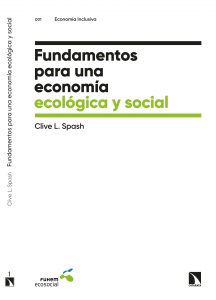 In 2020 my monograph on social ecological economics was published in Spanish Fundamentos para una economía ecológica y social ISBN: 978-84-1352-124-4 Madrid: FUHEM Ecosocial & Catarata (2020) 252 pages. A related interview in Spanish is available here. The Spanish book synthesises a variety of ideas questioning the existence of “the economy” as a singular entity and the unsustainability inherent in models oriented to growth and capital accumulation. A set of philosophical positions are presented on the ecological and social economy in ontological, epistemological, methodological and ideological terms. The arguments I developed over two decades concerning the failures of orthodox economics and inadequacies of heterodox approaches, with regard to addressing environmental concerns, were briefly overviewed. The core thesis put forward is the need to reformulate economics building from a philosophically well grounded heterodox approach that seek to integrate ideas rather than tolerate contradiction and incoherence under the guise of pluralism. This is argued to be necessary to inform understanding of the variety of economies that exist and to achieve transformation to alternatives to capitalism.
In 2020 my monograph on social ecological economics was published in Spanish Fundamentos para una economía ecológica y social ISBN: 978-84-1352-124-4 Madrid: FUHEM Ecosocial & Catarata (2020) 252 pages. A related interview in Spanish is available here. The Spanish book synthesises a variety of ideas questioning the existence of “the economy” as a singular entity and the unsustainability inherent in models oriented to growth and capital accumulation. A set of philosophical positions are presented on the ecological and social economy in ontological, epistemological, methodological and ideological terms. The arguments I developed over two decades concerning the failures of orthodox economics and inadequacies of heterodox approaches, with regard to addressing environmental concerns, were briefly overviewed. The core thesis put forward is the need to reformulate economics building from a philosophically well grounded heterodox approach that seek to integrate ideas rather than tolerate contradiction and incoherence under the guise of pluralism. This is argued to be necessary to inform understanding of the variety of economies that exist and to achieve transformation to alternatives to capitalism.
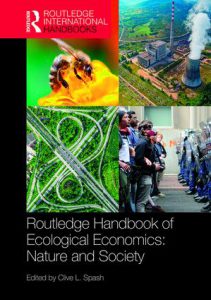
In 2017, after several years work, I completed a collection in 50 chapters of original essays on ecological economics from an international group of authors, the Routledge Handbook of Ecological Economics: Nature and Society. (external link). This book brings together 50 new articles covering the range of topics that constitute ecological economics as a biophysically informed social science. The article have been commissioned by the editor from 63 international authors.The Handbook is the most comprehensive single source of original work on Ecological Economics to date. It addresses the meaning and content of Ecological Economics as a field of knowledge covering both critical social and natural science perspectives. A special emphasis is placed upon the importance of social ecological economics. It dispels the myth of there being no alternatives to mainstream economics and orthodox thinking, analysis and tools. Each chapter provides a succinct summary (5000 words) including future directions, key references and further reading. It provides a source for those seeking to explore ecological economics as researchers, teachers and students.
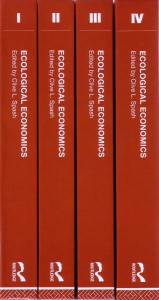 In 2009 I published a major work in 4 volumes on Ecological Economics (external link), bringing together 99 previously published papers by different authors. Each volume includes and introduction to the readings that offers an overview and synthesis. Unlike some such collections all articles were re-typeset (not merely photocopied) providing a clean high quality text. This was produced by Routledge for sale to libraries and the price is otherwise prohibitive, but it does provide a great library resource for research and teaching. The collections extends well beyond the typical texts ad does not focus solely or primarily on the journal ecological economics (unlike some others); the reason why is also explained in Volume 1. The four volumes cover: foundations (beyond standard economics, economics and biology, thermodynamics and energy); sustaining well-being (economic growth, consumer society, future generations); environmental values (valuation, environmental ethics); policy problems and approaches.
In 2009 I published a major work in 4 volumes on Ecological Economics (external link), bringing together 99 previously published papers by different authors. Each volume includes and introduction to the readings that offers an overview and synthesis. Unlike some such collections all articles were re-typeset (not merely photocopied) providing a clean high quality text. This was produced by Routledge for sale to libraries and the price is otherwise prohibitive, but it does provide a great library resource for research and teaching. The collections extends well beyond the typical texts ad does not focus solely or primarily on the journal ecological economics (unlike some others); the reason why is also explained in Volume 1. The four volumes cover: foundations (beyond standard economics, economics and biology, thermodynamics and energy); sustaining well-being (economic growth, consumer society, future generations); environmental values (valuation, environmental ethics); policy problems and approaches.
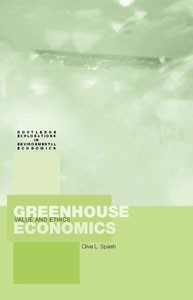 There is a separate page for my book on human induced climate change Greenhouse Economics that gives more details and some downloadable chapters. This includes critical reflections on the work of William D. Nordhaus and his ad hoc assumptions used to justify avoiding action on greenhouse gas reduction. See the chapter on ‘rolling the DICE’. Despite the paucity of his work his was awarded the Sveriges Riksbank Prize in Economic Sciences in Memory of Alfred Nobel. Despite being early on the scene this book’s criticisms of cost-benefit approaches and the new climate economics unfortunately remains as relevant as ever. This and more recent work (including emissions trading) is covered under human induced climate change research.
There is a separate page for my book on human induced climate change Greenhouse Economics that gives more details and some downloadable chapters. This includes critical reflections on the work of William D. Nordhaus and his ad hoc assumptions used to justify avoiding action on greenhouse gas reduction. See the chapter on ‘rolling the DICE’. Despite the paucity of his work his was awarded the Sveriges Riksbank Prize in Economic Sciences in Memory of Alfred Nobel. Despite being early on the scene this book’s criticisms of cost-benefit approaches and the new climate economics unfortunately remains as relevant as ever. This and more recent work (including emissions trading) is covered under human induced climate change research.
Amongst my edited volumes is an exploration of what has become since termed ‘ecological macroeconomics’. This collection on Post-Keynesian and Ecological Economics (external link) was co-edited with two Post-Keynesian economists Richard Holt and Steve Pressman. Mainstream economics is limited in its ability to analyse and develop adequate public policy to deal with environmental problems and sustainability but the heterodoxy (outside of ecological economics) has largely failed to address the environment. This book provides an initial attempt to building on the strengths and insights of Post Keynesian and ecological economics. My own chapter explores the tension between the two but also their ontological similarities. A range of work appears in other chapters in such areas as economic complexity, bounded rationality and social economic dynamics.
